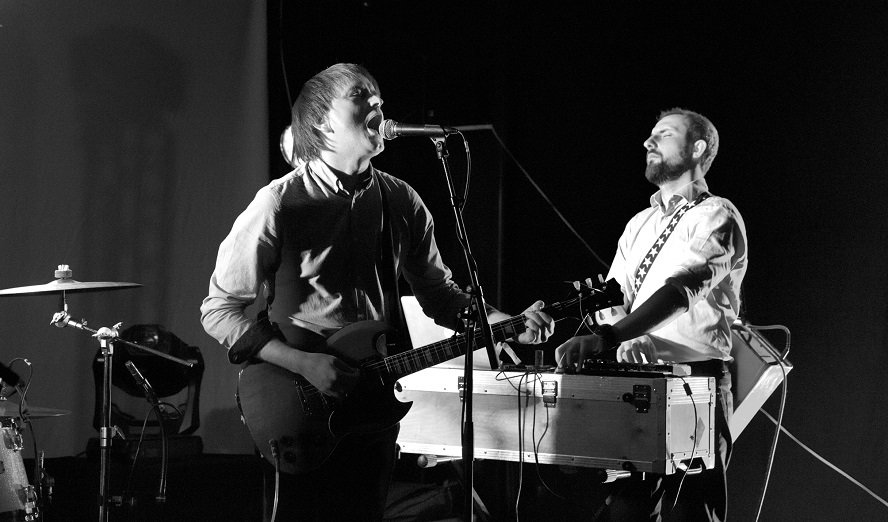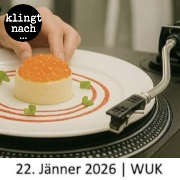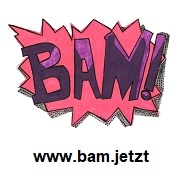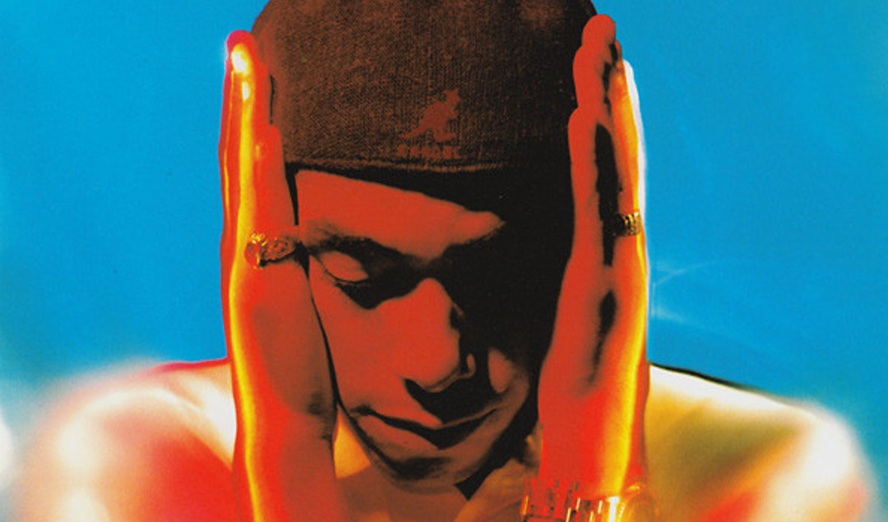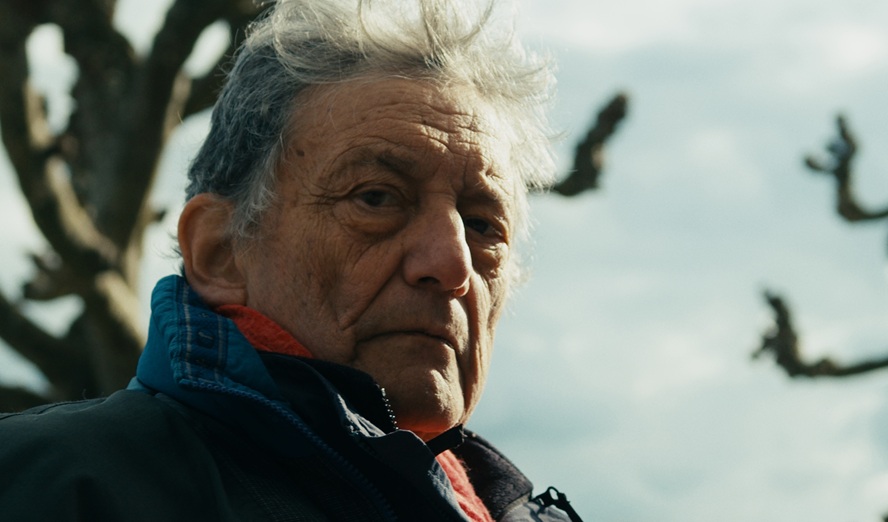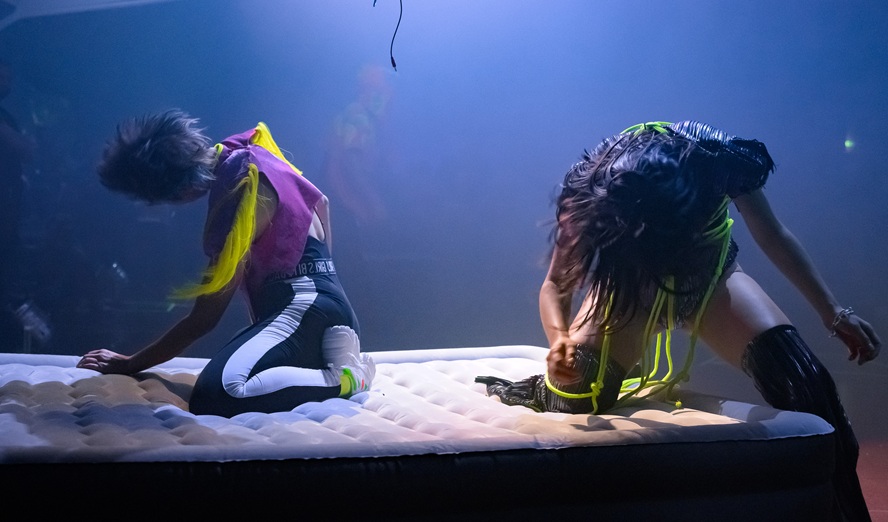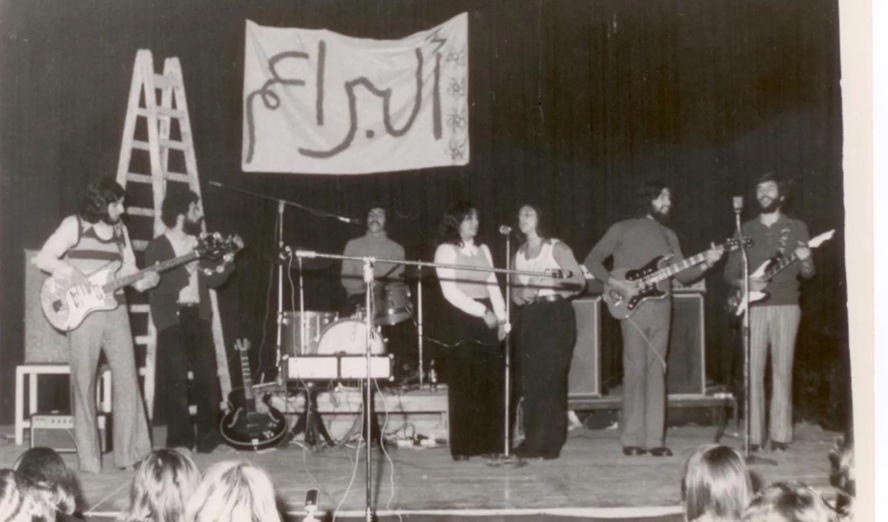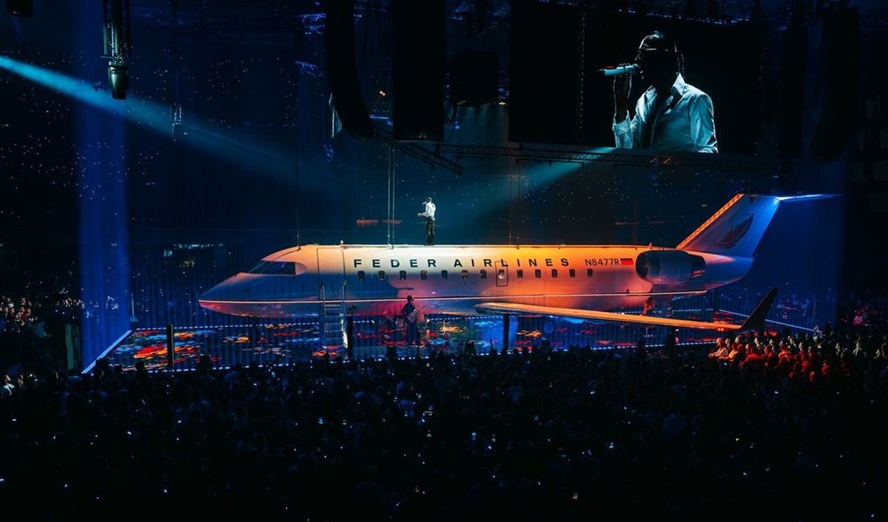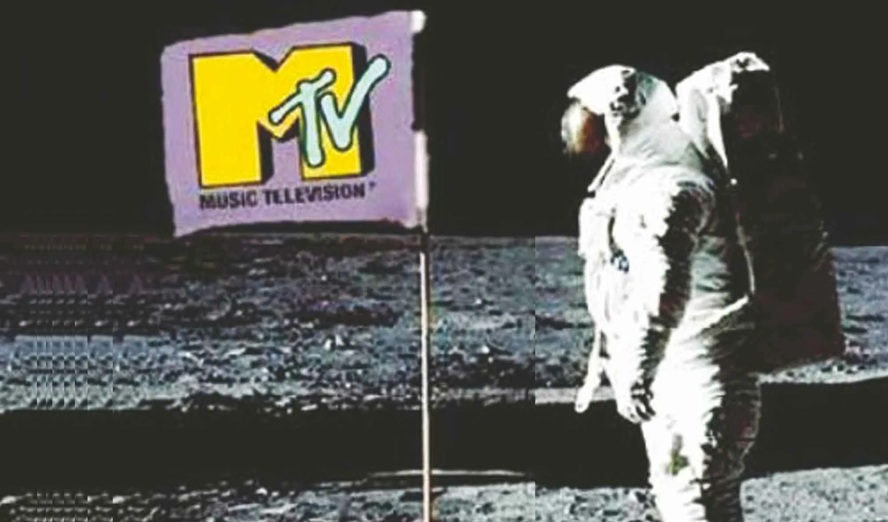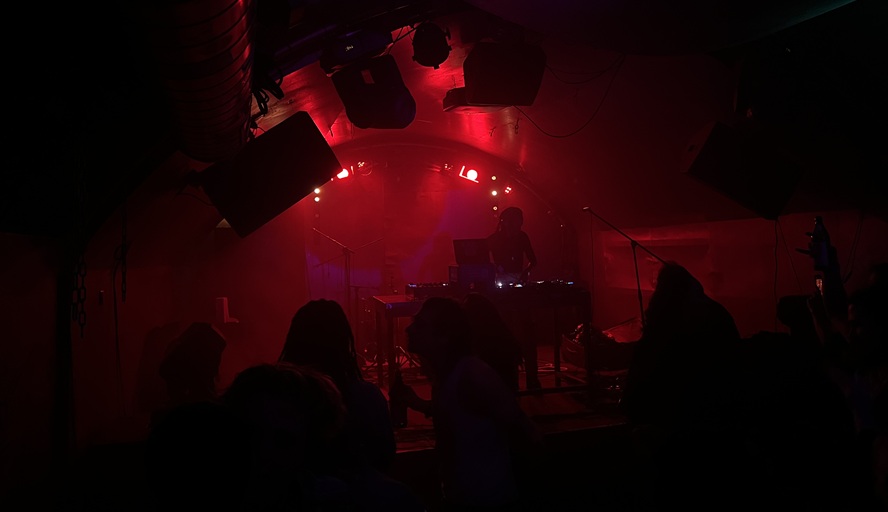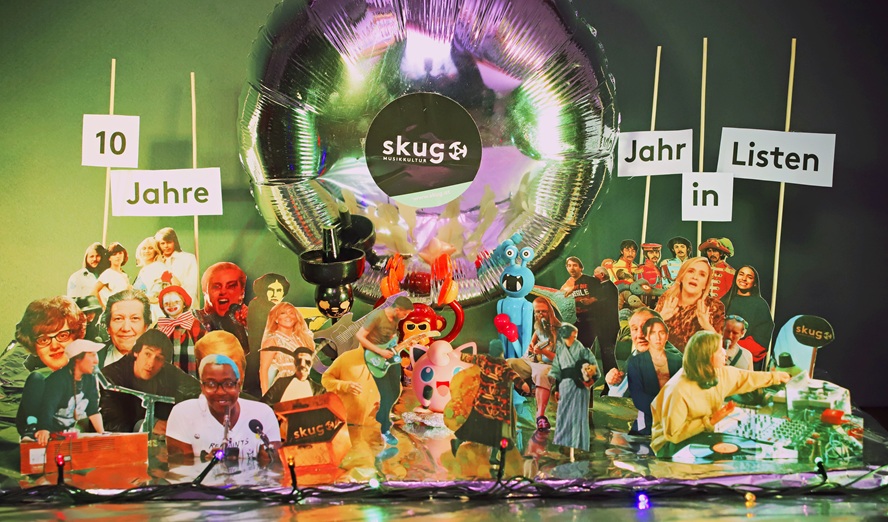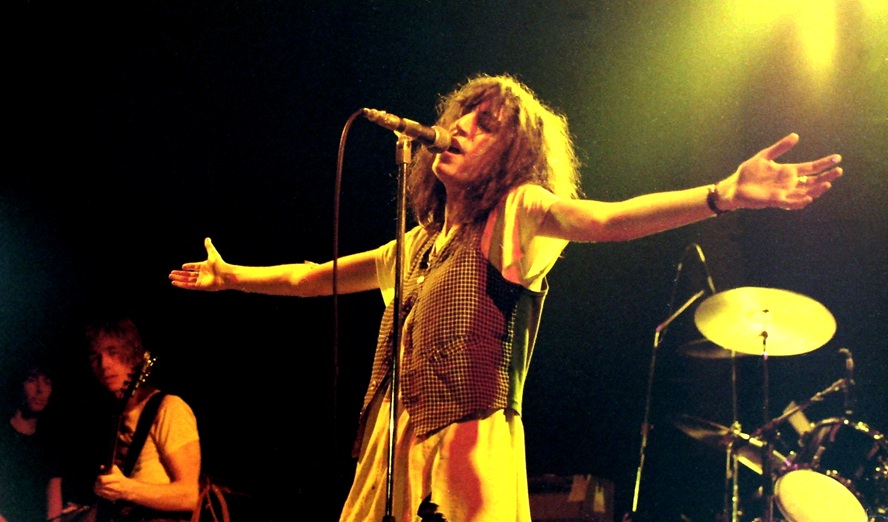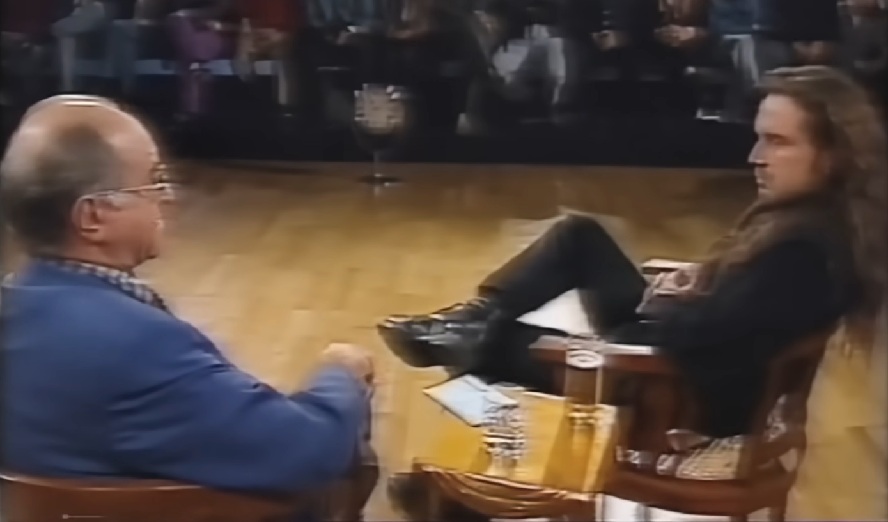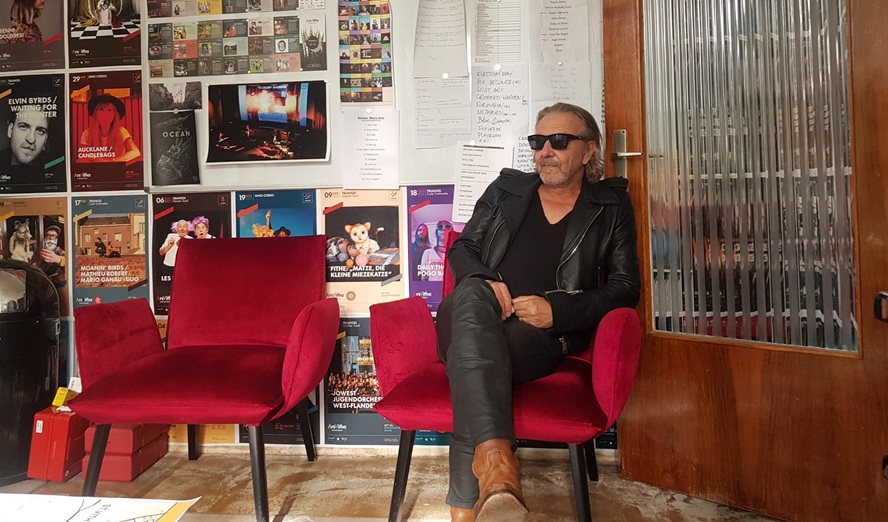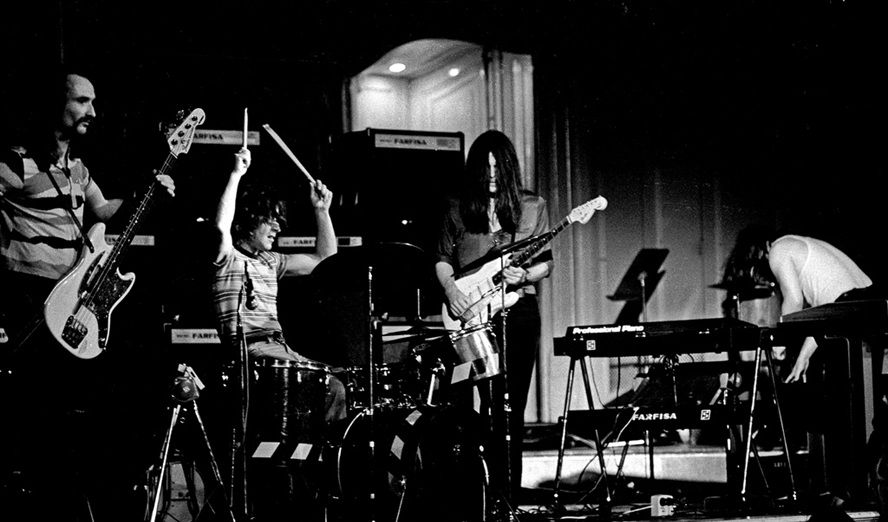Have you ever heard of Bailter Space? In the 1990s, this New Zealand band played great concerts that lifted you to a higher level of being. However, as far as I remember, they did not sound as post-punk as Trupa Trupa. Trupa Trupa played their instruments so hard and fast that you felt like you were flying into outer space. Even though they are not free jazz but rather free rock with warm, melodic hooklines, the songs are not bound into a corset, they are let loose and drift to new heights. They really played the best concert at the Waves Vienna Festival 2018. The quartet started at 7 pm and finished with a feedback-free rock-workout at 7.45. A selected audience showed, the knowing ones, so to speak. Trupa Trupa are definitely destined for greatness. Enlightenment through sound! (Not God!) After the show, we met backstage. Rarely you find a band’s internal democracy as developed as in Trupa Trupa. For the following interview, mainly Grzegorz Kwiatkowski (vocals, guitar) and Rafał Wojczal (keyboards, guitar) were answering our questions but the whole band – including Wojciech Juchniewicz (bass, guitar, vocals) and Tomek Pawluczuk (drums) – were listening. A band with humour and a big attitude, insisting on human rights.
skug: How did you put your Bo Diddley guitar together?
Rafał Wojczal: You mean how I made the guitar, right? Okay, so the guitar is made out of some scrap, just trash that I found. Actually, I really wanted to have this oil can guitar, but I could not find a properly shaped can, and finally I found it in a nearby guitar factory’s trash container. So, finally this is an old guitar mixed with some can, it is nothing special, to be honest.
But what was the idea behind it? I know Bo Diddley had a guitar kind of like that?
Rafał: Yeah, there are many people who have self-made guitars made from weird shapes and materials. There was no idea behind this. Maybe there was a guy at a festival, he had this metal can guitar. I did not really like the sound, but I liked the idea about the guitar which is different than Les Paul, SG or Stratocaster. I just wanted to have something original, and to be honest I did not have a good guitar back then. So, the idea was to make something new from something that I had back then.
Grzegorz Kwiatkowski: I think he thought about himself as a very conscious and very normal individual, but this guitar is kind of a proof that he is absolutely insane.
There are no other guitars? This is still the first one you built?
Rafał: I built a second one. That one is actually made better because I’ve made it with better tools and it is just more proper. The cuts are even, and everything is good. But it does not sound as good as the first. I like this one because this is the first one I made. I had this very old guitar my brother gave me, but the shape of the guitar was like the guitar of a heavy metal player, with very sharp edges. I kind of liked the sound, but I could not imagine myself playing on this heavy metal guitar on a stage like this. So, this is why I changed the body of this guitar.
Grzegorz: Because it could be a kind of a statement, this guitar from the heavy metal music scene. This guitar shows very unconsciously the meaning of the band, I mean that DIY thinking. Not that we want to be DIY, but we just do not have money. No, many purposes are real. We want to try to get the best out of things we have, in our rehearsal room and with our ideas.
Rafał: And maybe it is good because this made the sound of our band. You know if we had a lot of money, we all would have Stratocasters and Twin Reverbs and all this stuff you can just buy in the store, but then the sound of our band would be average, and because we have some gear that is not actually meant to be something.
Grzegorz: Is that something shitty?
Rafał: It is something shitty, something that was there, and this is what we use, and this is what makes our sound!
Grzegorz: And that is what is most important and that is what makes our sound and I hope this sound is specific and so we should try to be DIY for as long as we can be.
That leads to the question, could you keep this DIY philosophy in relation to your new songs?
Grzegorz: Actually, we had a few more in the past, but we are very proud of »Headache« and »Jolly New Songs« in the way of producing, mixing and mastering. So, there are good sides of DIY and bad sides, if you are working with a DIY producer, who is not experienced and who is mixing, it’s usually not great. It is great, if we have great partners who are taking our DIY way of thinking and are doing something really strong with it. But we are really proud of these two albums »Headache« and »Jolly New Songs«.
How come you released it on Ici d’ailleurs, which is a French label?
Grzegorz: Yeah, we released »Jolly New Songs« on Ici d’ailleurs, and also on Blue Tapes in the UK, and also on Moorworks in Japan, so there are three labels connected to »Jolly New Songs«. After we recorded the »Headache« album, we got very good PR from around the world, we had lots of really great reviews, for example, Sasha Frere-Jones from »The L.A. Times«. The thing is, the people from the industry found out there is something interesting in Gdańsk and they did that.
Does this help to get concerts at festivals?
Grzegorz: Yes, we played at many festivals and we will play at more festivals. We are connected with the ATC live booking agency, which is really great, so we will play a lot.
You also played with Mia Zabelka, is that right?
Grzegorz: We did not play with Mia Zabelka, but we know Mia Zabelka. Yeah, in Croatia, I hope it will happen in the future.
But your gig at Waves Vienna was the first one in Austria?
Grzegorz: Yeah, it is our first time in Austria, and it really looked like a wedding.
Rafał: Yeah, the blue light!
Grzegorz: It was really kind of horrible, actually.
Rafał: Abstract.
Grzegorz: Yeah, for the first half of the gig I had my eyes closed, I didn’t want to watch it. But I think it was a really good gig, the energy was really strong and when I felt that, I opened my eyes.
But isn’t it a pity to play first and in front of only a few people?
Grzegorz: No, I don’t know, I think that …
Rafał: … sometimes it’s better, sometimes it’s worse. It doesn’t really matter. Even if five people come and they want to listen to us, we play the same way.
We really enjoyed seeing you.
Rafał: So, we are happy about it. You were one of fifty people here.
Grzegorz: No, at the end of the gig there were like a hundred people.
Rafał: It doesn’t really matter. Sometimes it is harder when there are three people in the audience. Sometimes you feel so disappointed when nobody comes, but it is the same gig. It does not really matter if it is five or ten or a hundred, and then when you play at a big summer festival and 3,000 or 5,000 people come it is again a very hard situation to handle because there are so many people out there and they are all listening to us. There is no perfect situation, but everything has to be done good and in a proper way.
Grzegorz: I think he is right, and I think that less is more, really. If we feel conscious about what we’re doing, usually it’s alright. Rafał is right, it is not true that it will be better for us because we really like to play in the small halls, not only at big festivals, but there are not any rules. The main rule is to be ourselves. We have to feel alright, to be with friends and to feel secure, and that is the most important thing.
A big influence seems to be post-punk. Sometimes I was reminded of The Fall?
Grzegorz: We were playing with The Fall in France. It was our last gig.
Rafał: These old guys?
Grzegorz: What was the band …
And somehow Trupa Trupa remind me of early Polish post-punk band Siekiera …
Grzegorz: I think that you are asking about inspirations? We’ve got a democratic structure in the band and every one of us listens to different music. One of us listens to Fugazi and Sonic Youth, the other one listens to Elliot Smith, and I enjoy the Beatles and classical music. I think a very important thing for us is: we do not have a leader. We do not have a front man. We are trying to mix our ideas and we do not want to be authoritarian »Nazis« in any way. So, it is very hard, really, to make democracy alive in a band. But we are doing it and I think these songs are a combination of many, many things …
But it is mostly coming from you?
Grzegorz: Not mostly, I think it comes from half of them. When Wojtek is singing, it is his lyrics. When I am singing, they are my lyrics. For example, on the next album, we will have his songs and his lyrics. I think it is really a great situation that we have got our own point of view and it is not one point of view. And, of course, we argue, sometimes it is not nice, but it is better than to have a leader who says you should play this and this and this. For us it would be the end of the band, really.
Rafał: Probably it was not The Fall. The Wire, it was The Wire. We were not sure who it was. We have not played with the Fall.
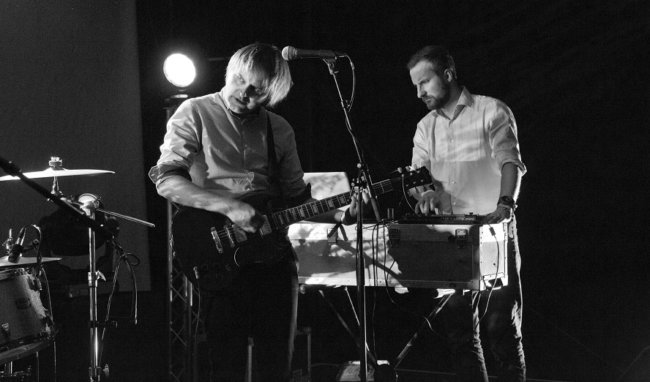
During the concert, I heard you singing »the Holocaust did not happen«. Maybe I misheard?
Grzegorz: That was not the plan.
Rafał: It was hard to understand because of the guitar effects and everything. He said something else that you probably did not hear. What he said was »There are people who claim the Holocaust did not happen. Fuck them«.
… is it one of your Shoah poems?
Grzegorz: Yeah. I know the poem. And it was not my statement, this thing about the Holocaust, but I said it. In an unconscious way, really, and I am happy that I did it in Austria, in a place that really did not have a good denazification. Every country has its own things. Some better. But Austria is really a great example. Great in a bad way. They said: We were a victim of Hitler, like Czechoslovakia. Because he went to Austria and he took it. But of course, Adolf Eichmann was an Austrian, and Adolf Hitler was an Austrian, and Wolfgang Amadeus Mozart was an Austrian. So, of course, it is very complicated.
I respect that your grandfather was a survivor of a concentration camp, too. This is just a part of your band’s lyrics and the poems you publish in books.
Grzegorz: It is not my band. The lyrics are all different. If I would have one band and they all said the same thing it would be boring. It would be just monothematic and boring. I think that the topic is not the most important part. The music is the most important part. The topic is important, but it should fit to the music in its structure. So, we are not so political, really.
Rafał: We do not get into politics.
Grzegorz: For example, this statement was the first statement we really made.
But we are living in pre-fascist times.
Grzegorz: Yeah, in some way.
And if nothing happens from our side, our democracy will be over. What do you think about democracy in Poland? The PiS party … you write songs about that?
Grzegorz: We are not writing things about the actual situation, but we write songs – I hope so – about objective situations.
Rafał: About global situations. Because this is global. Of course, we are in some way ashamed of what is going on.
But that is global.
Rafał: It is. We can talk the same way about the Austrian government and the last election. It’s not that I try not to talk about Poland right now. We can talk about Poland, it is not a problem. We are not very happy about what is going on in politics. But this is the global way of where it goes. And we can be pissed about this, and we can try to create awareness in some aspect. We try as much as we can with the tools we have. The music. The lyrics. It is not about if we are anti-PiS. It is not about this one party.
Grzegorz: I can say this about the situation in Poland: The biggest problem in Poland is not PiS. The biggest problem is that we do not have a good opposition. We do not have good structures, good intellectuals. We did not build an organic way, good people to being governed …
Rafał: We just do not have the right people to run our country. And this is also because of the history, which is very sad. During and after the Second World War we have lost almost all of the intellectuals in Poland. So, after communism we are still developing things. But right now, it is probably not going into the right direction.
Grzegorz: If we think about the right-wing as a way of Nazism and fascism, it is not that in Poland now. It is really not that. We have freedom of speech. It is not so bad. I do not say they are right, but it is not so bad.
Rafał: Of course, it is going into a bad direction, in my opinion. It did not get too bad yet, but it is getting there. But right now, it is not so bad, it is not Russia, it is not Belarus. We are still far away from that.
Grzegorz: It is not even Hungary, really.
Rafał: Of course, the direction we took will lead directly there.
Grzegorz: But the biggest problem is the problem with communication. And the problem is, if you are from PiS and I say you are a fucking cheater and liar and Nazi, you will not talk with me, it is the end of communication. And the problem is it puts us in this theatrical position of good and bad, which is the end of the conversation. And it is the biggest problem in Poland that now we are really ending the conversation with each other. Because if we do not have the diplomacy and understanding for our rules, because people are right or left wing. It is normal, and we cannot say to right-wing people: you are fucking Nazis.
Rafał: Because then we split. And this is what is happening in our society. We just split.
Grzegorz: It is totally not good. For example, right now the Christian church is again under surveillance for paedophilia. And, of course, it is fucking bad. But if you say that all of the priests are paedophiles, that is not true. And if you say that most of the priests are, it is also not true. And if you do not respect them as human beings, it is the end of progress. Or, if we talk about Austria and Germany, because there was a Marshall plan in Germany. It was a really great plan. Oh, right, Germany was defeated. I understand this anger after the war, but we are not really in a war state. And the biggest problem is not … I know it’s hard. For example, if you have such »friends« that say: there was no Holocaust, there were no gas chambers in Auschwitz. And you are arguing with them.
Rafał: People say, for example: you can go to Auschwitz and there are no gas chambers.
Grzegorz: And they say: I read a book and they were built after the war and … You can say: fuck you, fucking Nazi.
Rafał: But it is the end of the conversation.
Grzegorz: Or you can say: please, let’s talk.
Rafał: About facts and stuff. That is not happening right now.
The right wing tends to attract people who are not respected by the state. For example, in Saxony or near Poland. The Western Germans came to the ex-GDR, bought all the companies and after a while many companies shut down, and a lot of people were disrespected … These humiliated citizens are often easy prey for right-wing initiatives.
Grzegorz: Capitalism has good and bad ideas. One good capitalist idea is: very radical parties are not allowed into power for a really long time because they want to sell stuff. And you are buying stuff when you are quite happy. And if you are in a state of war and a radical situation there is a problem. It may be a war or a civil war. And I think that the real governor of humanity is capitalism and the businessmen. They will not let real big radical ideas spread in the world. They are so cynical. But for them it is just not …
Rafał: But if it makes any business or money, there are situations where they would go this way.
Grzegorz: For example, the money for war.
Rafał: Businessmen, they would go for the weapon industry and then …
Grzegorz: Unfortunately, he is right (laughs).
Because for the capital owner it is easier to do business with dictatorships or autocratic regimes.
Rafał: War is a business for many people. If you look at it from an economic point of view, look at how the United States exist. They have made a lot of money on wars. Even the companies that are not national but just private companies that make weapons and stuff like that, they make a lot of money and the whole country, we can say, stays on this. If you go to war zones or refugee camps and stuff like that you will be surprised by how much money you have to have to just buy bread or water and stuff like that. You know, in Somalia water is more expensive than anything we can imagine, and if you go to Moria, the refugee camp in Lesbos, people pay a shitload of money to get travel documents, which sometimes work and sometimes don’t. For example, you pay eight hundred Euro for some kind of fake documents, and then you think: ok, I have these documents and I can go where I want now. And then you go to the border and the border control says: these documents are fake, you have to go back. You just spent a lot of money and you still have to live in a tent inside the refugee camp. There is a lot of business in Ukraine right now because of the war … I mean, you can make money in peacetime, too. You can sell computers, cars, Tesla and stuff like that. There is no need to make war to make business, in my opinion.
Grzegorz: I agree with both of you in the way that we should look at the things in a very conscious and a very careful way. For example, we were making a documentary about a Holocaust survivor, Mr. Albin Ossowski, he unfortunately passed away. And he said: I do not talk about the Holocaust because I like to talk about the Holocaust, but because I know that people are denying it.
Rafał: He says he wants to talk about the Holocaust because he wants it not to happen again. And this is the famous quote, I don’t know who said it (editor’s note: George Santayana), but »those who cannot remember the past are condemned to repeat it.« So, this is why he wanted to talk about the Holocaust.
But how did this political stuff enter your music? Just through your lyrics?
Rafał: I don’t really think it is political.
Grzegorz: I think it is not political. We have a song called »Never Forget«.
Rafał: It is about human beings.
Grzegorz: There is a line: »We will never forget those ghetto deaths.« It can mean the ghettos in Poland, but it can also mean the ghettos in modern cities.
You have gated communities, even in richer developed states.
Grzegorz: You are right. But I really think, we are conscious in a political way. But you were talking about my poem »Yea, Yea / Nay, Nay«. It is about war. But the poem is also about there being no easy answers.
Since Donald Trump, lying in politics is back in fashion again. »Yea, Yea / Nay, Nay« tells an awful truth. If you did not lie under Nazi occupation by hiding Jews, it means you probably denounced them to the Gestapo under the justification of a moral conscience that lying is bad.
Grzegorz: It is very cynical. I think the more important thing is, you know, in Gdánsk there was a famous philosopher born, Arthur Schopenhauer, the biggest philosopher of pessimism. And he did not write about politics but about human beings and about their way of thinking, which is very much the same. Of course, people like Donald Trump, they are changing everything. Because of lying so much. I do not think there were any politics like that in the past. It is changing the rules, really. But anyway, our statement is … I do not think we have a statement, really. We are making music and we want to move someone with this music. On the other hand, we often receive this statement: »They should not have been born.« And I think it is kind of a solution … it’s too easy.
Poland had intellectuals who ruled the country, but somehow it went wrong.
Grzegorz: It went wrong because Polish intellectuals and the Polish left cheated. Of course, not all of them. But some of them were just friends of big businessmen and people did not trust them.
This is a problem for all social democrats.
Grzegorz: And it is shocking that you believe in a politician and after that you find out that he was just a businessman. He was not the man from the left, but he was just a businessman. It is very disappointing. I think the whole world has this problem.
Worse is, that people feel betrayed and elected politicians are betraying even more.
Grzegorz: For example, in our band there is no person who is right-wing, and even if we know that the opposition is very bad, we do not think it is the right way, it is not a solution.
But which party would you vote for?
Grzegorz: I do not know. I think we are all waiting for a new great opposition. We are waiting for a new generation of young people that will be very ethical. We are really waiting for it, really.
Maybe you should go into politics.
Grzegorz: (laughs) We are doing our thing. But I really understand your point of view. I was a member of Amnesty International for many, many years. I get the point. But usually art is a very egoistic thing, so you should forgive us. On the other hand, there were bands like Fugazi that were really politically active. Fugazi is one of the best bands for us. We love them.
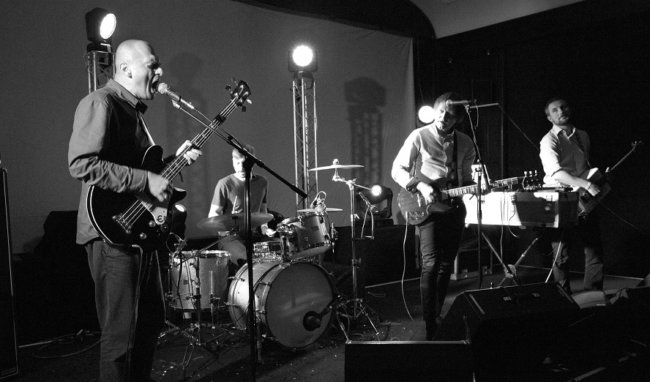
»Yea, Yea / Nay, Nay« was published in Grzegorz Kwiatkowski’s book »Should Not Have Been Born« (OFF_PRESS, London, 2011). Up next: skug author Lutz Vössing will concentrate on Grzegorz Kwiatkowski’s writing about the Shoah. The trilogy »radości – Freuden« / »spalanie – Verbrennung« / »sową – Eule« was published in Wrocław by Biuro Literackie. Bernhard Hartmann already translated it into German, but an editor has yet to be found.
